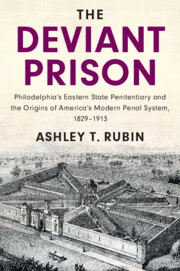 The Deviant Prison
The Deviant Prison Book contents
- Frontmatter
- Contents
- List of Figures
- List of Tables
- Acknowledgements
- List of Abbreviations
- A Brief Timeline
- Important Actors
- Introduction
- Part I Becoming the Deviant Prison: Establishing The Conditions for Personal Institutionalization
- Part II THE ADVANTAGE OF DIFFERENCE: The Process of Institutionalization
- Part III Forced to Adapt: The Conditions for and Process of Deinstitutionalization
- Conclusion Conclusion
- Appendix A Inspectors
- Index
Conclusion - Conclusion
Published online by Cambridge University Press: 12 January 2021
- Frontmatter
- Contents
- List of Figures
- List of Tables
- Acknowledgements
- List of Abbreviations
- A Brief Timeline
- Important Actors
- Introduction
- Part I Becoming the Deviant Prison: Establishing The Conditions for Personal Institutionalization
- Part II THE ADVANTAGE OF DIFFERENCE: The Process of Institutionalization
- Part III Forced to Adapt: The Conditions for and Process of Deinstitutionalization
- Conclusion Conclusion
- Appendix A Inspectors
- Index
Summary
This chapter describes the Pennsylvania System’s rapid decline at Eastern in the 1860s and 1870s. Catastrophic levels of post-war overcrowding caused the Pennsylvania System's most central components to break down in ways that the administrators fought hard to prevent or stop. However, the administrators’ verbal commitment to the Pennsylvania System ultimately outlasted its physical presence at Eastern. By the mid-1870s, something changed in the administrators' commitment: increasingly, the administrators abandoned their attempt to save the Pennsylvania System and instead redefined it into something else. This shift occurred after external criticism of the Pennsylvania System had abated. Thus, when Eastern's administrators finally abandoned the Pennsylvania System, they were not acceding to public pressure that they had withstood for nearly five decades. Instead, waning criticism had removed the administrators' opportunity to defend the Pennsylvania System and tout their own excellence, thereby allowing the Pennsylvania System to deinstitutionalize for Eastern's administrators.
Keywords
- Type
- Chapter
- Information
- The Deviant PrisonPhiladelphia's Eastern State Penitentiary and the Origins of America's Modern Penal System, 1829–1913, pp. 325 - 336Publisher: Cambridge University PressPrint publication year: 2021


